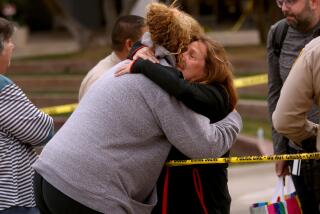Virginia Tech victim is behind campus safety app LiveSafe
Kristina Anderson was a sophomore at Virginia Tech when she was shot twice in the back and once in the foot on April 16, 2007. In less than 12 minutes, the gunman shot and killed 11 of her classmates and one of her professors.
Six years after the massacre, Anderson, 25, has dedicated herself to promoting campus safety and is part of a team that believes technology can save lives.
Anderson is launching a free smartphone app called LiveSafe (available on iTunes in mid-May) to reach and alert students on campuses during emergencies, something that she wished sheâd had that April morning. Even though the first shooting occurred around 7:05 a.m., neither she nor her classmates knew about it when the gunman entered their class more than two hours later. A notification from the campus police might have changed her fate, Anderson said.
âIf smartphone capability was as widespread back then, I probably would have seen an email, texts or pictures all pointing to this one incident on campus, but we had no prior knowledge anything was going on,â Anderson said.
The app, created and cofounded by Anderson, Shy Pahlevani and Samier Mansur, is like a crime watch for smartphones: It connects students and campus police in a two-way dialogue and enables information to be shared instantaneously.
Students can anonymously record crime-scene audio, video and images tagged with GPS information for investigators and officials.
Once a user submits a tip, such as an accident or robbery, the information goes directly to campus police via push notifications, emails and voice, using either data or Wi-Fi connections.
In the event of a major emergency, the LiveSafe technology filters through the various tips and creates buckets, prioritizing events and emergencies. So if someone is reporting an active shooter, for instance, that incident would be put on the top of the list, and dispatchers could create work flows for respondents from there.
Although technology has great potential, social media is already heavily used in times of emergency. This month, the Cal State L.A. campus was evacuated after a bomb threat, and the university posted information on its Twitter and Facebook pages announcing the evacuation and closure. Still, many students complained they didnât receive information on the bomb threat through the universityâs text or email emergency notification system.
LiveSafe is currently focused on creating partnerships with school districts and police departments. The company also wants to resell and distribute its services to emergency equipment makers, software companies and crime analysis services.
The app is being tested on two campuses: South Carolinaâs Winthrop University and the University of New Hampshire. According to Anderson, Winthrop had 90% of its students download the app within a month.
An app for devices running the Android operating system should be available shortly after the Apple iOS version is released next month.
Follow @JessicaNaziri on Twitter
ALSO:
Start-up Sunday: Selling stuff just got a little easier with Sold
Start-up Sunday: KillSwitch app wipes out painful reminders on Facebook
Start-up Sunday: Mango Health app tries to make managing meds fun and games






